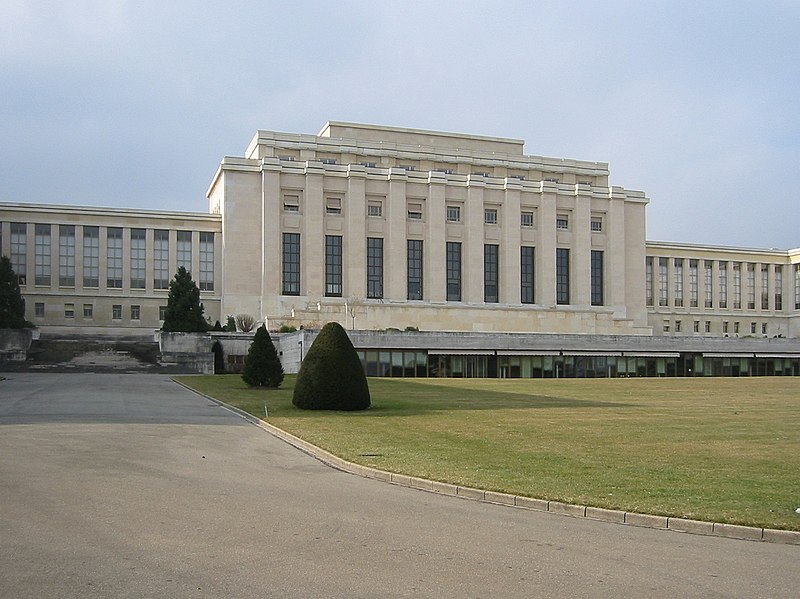
FROM WIKIPEDIA COMMONS
The League of Nations (French: Société des Nations [sɔsjete de nɑsjɔ̃]) was the first worldwide intergovernmental organisation whose principal mission was to maintain world peace. It was founded on 10 January 1920 by the Paris Peace Conference that ended the First World War. The main organization ceased operations on 20 April 1946 but many of its components were relocated into the new United Nations.
The League’s primary goals were stated in its Covenant. They included preventing wars through collective security and disarmament and settling international disputes through negotiation and arbitration. Its other concerns included labour conditions, just treatment of native inhabitants, human and drug trafficking, the arms trade, global health, prisoners of war, and protection of minorities in Europe. The Covenant of the League of Nations was signed on 28 June 1919 as Part I of the Treaty of Versailles, and it became effective together with the rest of the Treaty on 10 January 1920. The first meeting of the Council of the League took place on 16 January 1920, and the first meeting of Assembly of the League took place on 15 November 1920. In 1919 U.S. president Woodrow Wilson won the Nobel Peace Prize for his role as the leading architect of the League.
The diplomatic philosophy behind the League represented a fundamental shift from the preceding hundred years. The League lacked its own armed force and depended on the victorious First World War Allies (Britain, France, Italy and Japan were the permanent members of the Executive Council) to enforce its resolutions, keep to its economic sanctions, or provide an army when needed. The Great Powers were often reluctant to do so. Sanctions could hurt League members, so they were reluctant to comply with them. During the Second Italo-Ethiopian War, when the League accused Italian soldiers of targeting International Red Cross and Red Crescent Movement medical tents, Benito Mussolini responded that “the League is very well when sparrows shout, but no good at all when eagles fall out.”
At its greatest extent from 28 September 1934 to 23 February 1935, it had 58 members. After some notable successes and some early failures in the 1920s, the League ultimately proved incapable of preventing aggression by the Axis powers in the 1930s. The credibility of the organization was weakened by the fact that the United States never joined the League and the Soviet Union joined late and was soon expelled after invading Finland. Germany withdrew from the League, as did Japan, Italy, Spain and others. The onset of the Second World War in 1939 showed that the League had failed its primary purpose; it was inactive until its abolition. The League lasted for 26 years; the United Nations (UN) replaced it in 1946 and inherited several agencies and organisations founded by the League.
TODAY’S ALMANAC
Monday, April 11, 2022
Question of the Day
Where did the phrase “pipe down” originate?At sea. It’s the boatswain’s call for all hands to turn in, and it became a colloquialism for “stop talking!” or “shut up!”
Advice of the Day
For everything you have missed, you have gained something else. —Ralph Waldo Emerson
Home Hint of the Day
In colonial times, wallpaper was hung with tacks; pasting came later. Borders made of separate pieces of paper have long been popular because they cover up ragged edges.
Word of the Day
Celestial sphereAn imaginary sphere projected into space that represents the entire sky, with an observer on Earth at its center. All celestial bodies other than Earth are imagined as being on its inside surface.
Puzzle of the Day
What happened to the dog that swallowed the firefly?It barked with de-light!
Died
- Samuel Heinrich Schwabe (German astronomer) – 1875
- James A. Bailey (circus showman) – 1906
- Luther Burbank (horticulturist) – 1926
- Erskine Caldwell (author) – 1987
- June Pointer (youngest of the singing group The Pointer Sisters) – 2006
- Kurt Vonnegut (author) – 2007
- Roscoe Lee Browne (actor) – 2007
- Jonathan Winters (actor) – 2013
Born
- Oleg Cassini (fashion designer who created the Jackie look, the signature wardrobe created for First Lady Jacqueline Kennedy in the early 1960s) – 1913
- Bill Irwin (actor) – 1950
- Jason Varitek (baseball player) – 1972
- Jennifer Esposito (actress) – 1973
- Trot Nixon (baseball player) – 1974
- Joss Stone (singer) – 1987
Events
- President Lincoln made his last public speech. He gave the speech at the White House and spoke of the reconstruction of the south, in particular Louisiana– 1865
- U.S. Navy bought its first commissioned submarine, USS Holland– 1900
- Geneva, Switzerland, was chosen as the headquarters of the League of Nations– 1919
- Jackie Robinson became the first African-American major league baseball player– 1947
- President Lyndon B. Johnson signed the Civil Rights Act of 1968– 1968
- Apollo 13 was launched, manned by astronauts James Lovell, John Swigert, and Fred Haise– 1970
- Rattlesnake bit a shopper in tree section of home improvement store– 2004
Weather
- New Jersey received two feet of snow– 1841
- Forty-eight tornadoes hit the midwest– 1965
COURTESY www.almanac.com

I’m really enjoying the theme/design of your web site. Do you ever run into any internet browser compatibility problems? A couple of my blog audience have complained about my site not operating correctly in Explorer but looks great in Opera. Do you have any advice to help fix this issue?